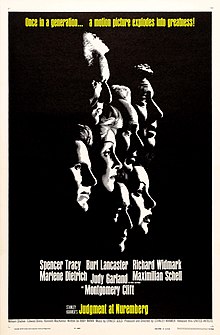
Back Judgment at Nuremberg AN حكم في نورمبرغ (فيلم) Arabic حكم فى نورمبرج ARZ نورنبرق سیناغی AZB Нюрнбергският процес (филм) Bulgarian জাজমেন্ট অ্যাট নুরেমবার্গ Bengali/Bangla Nirnberški proces (film) BS Els judicis de Nuremberg Catalan Judgment at Nuremberg Welsh Dommen i Nürnberg Danish
| Judgment at Nuremberg | |
|---|---|
 Theatrical release poster | |
| Directed by | Stanley Kramer |
| Screenplay by | Abby Mann |
| Based on | Judgment at Nuremberg 1959 Playhouse 90 by Abby Mann |
| Produced by | Stanley Kramer |
| Starring | |
| Cinematography | Ernest Laszlo |
| Edited by | Frederic Knudtson |
| Music by | Ernest Gold |
Production companies | Roxlom Films Amber Entertainment |
| Distributed by | United Artists |
Release dates |
|
Running time | 190 minutes |
| Country | United States |
| Languages | English German |
| Budget | $3 million[2] |
| Box office | $16 million[3] |
Judgment at Nuremberg is a 1961 American epic legal drama film directed and produced by Stanley Kramer, and written by Abby Mann. It features Spencer Tracy, Burt Lancaster, Richard Widmark, Maximilian Schell, Werner Klemperer, Marlene Dietrich, Judy Garland, William Shatner, and Montgomery Clift. Set in Nuremberg, West Germany, the film depicts a fictionalized version – with fictional characters – of the Judges' Trial of 1947, one of the twelve Nuremberg Military Tribunals conducted under the auspices of the U.S. military in the aftermath of World War II.
The film centers on a military tribunal led by Chief Trial Judge Dan Haywood (Tracy), before which four judges and prosecutors (as compared to sixteen defendants in the actual Judges' Trial) stand accused of crimes against humanity due to their senior roles in the judicial system of the Nazi German government. The trial centers on questions regarding Germans' individual and collective responsibility for the Holocaust, with the backdrop of a tense international situation including the onset of the Cold War, the Berlin Blockade, and the geopolitical ramification of the later Nuremberg Trials upon German support for the Western Bloc, placing great pressure on Haywood's efforts to reach a just verdict. In addition, the judge faces emotional challenges in his personal relationships with German people outside the courtroom who consistently claim ignorance of Nazi atrocities, but who the judge suspects may have known more than they will admit.
An earlier version of the story was broadcast as an episode of the same name of the television series Playhouse 90 in 1959.[4] Popular interest in this effort caused an expanded focus on its dramatic elements. Maximillian Schell and Werner Klemperer portrayed the same characters in both productions.
In 2013, Judgment at Nuremberg was selected for preservation in the United States National Film Registry by the Library of Congress as being "culturally, historically, or aesthetically significant".[5][6] The production's presentation of historical events has attracted interest over decades before and since then due to its place in the narrative portrayals of the Holocaust in film.
- ^ Scott, John L. (December 14, 1961). "West Berlin Reaction on 'Nuremberg' Awaited". Los Angeles Times: Part IV, p. 7.
- ^ Balio, Tino (1987). United Artists: The Company That Changed the Film Industry. University of Wisconsin Press. p. 145. ISBN 978-0299114404.
- ^ "Box Office Information for Judgment at Nuremberg". The Numbers. Archived from the original on November 28, 2011. Retrieved April 14, 2012.
- ^ "Playhouse 90 – Season 3, Episode 28: Judgment at Nuremberg – TV.com". TV.com. CBS Interactive. Archived from the original on March 7, 2016. Retrieved June 7, 2015.
- ^ "Library of Congress announces 2013 National Film Registry selections". The Washington Post (Press release). December 18, 2013. Archived from the original on December 18, 2013. Retrieved December 18, 2013.
- ^ "Complete National Film Registry Listing". Library of Congress. Archived from the original on August 29, 2008. Retrieved November 17, 2020.